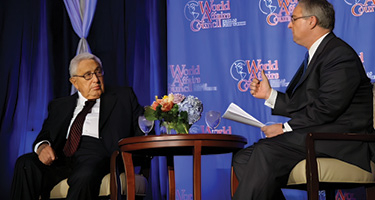Negotiation is a critical skill that is sorely misunderstood and all but ignored in law school curricula and firm training. While a select few might be gifted with a talent for negotiation seemingly from birth, the rest of us must hone our skills at a “petty pace from day to day to the last syllable of recorded time” (Macbeth). While “all the world’s a stage” (As You Like It), it’s also a classroom. One need not look hard to find lessons in negotiating all around us—sometimes in the unlikeliest places, such as the plays of William Shakespeare. Here are eight such insights drawn from the Bard of Avon’s unparalleled prose.
“Do not cry havoc where you should but hunt with modest warrant.” (Coriolanus) Negotiation is a process, not a competition. You need the right mindset—you’re trying to get an agreement, not win a debate. There’s no need to try to take by force what someone will give you willingly.
“But this swift business I must uneasy make, lest too light winning make the prize light.” (The Tempest) It’s not always important to move first, but your first move is always important. Anchoring and the “first-mover advantage” are legitimate, proven concepts that can psychologically affect a negotiation, but that doesn’t mean it’s always best to go first. In fact, doing so can backfire if you miscalculate or misunderstand your counterpart’s position, leverage or perception of value.
“For they say every why hath a wherefore.” (The Comedy of Errors) Find common interests and focus on them. Don’t assume what those interests are—ask! Be curious. You can’t find common ground if you and your counterpart are not looking at the same landscape.
“Though this be madness, yet there is method in ’t.” (Hamlet) Listen to hear and understand the other side’s perspective, not just to respond to what they say. Learn the forces that weigh on them and use that knowledge to inform your moves. Try to frame the negotiations and structure of your proposals in a way your counterpart (and the people to whom he or she answers) will find attractive.
“A night is but small breath and little pause to answer matters of this consequence.” (Henry V) It is difficult, if not impossible, to persuade by brute force or bombarding your counterpart with “facts.” Nor can you force someone to feel that your proposal is acceptable; they must do so at their own pace.
“Suit the action to the word, the word to the action.” (Hamlet) How you say something can be as important as what you say. Be respectful but firm, and mindful of your tone. To paraphrase Maya Angelou, people may forget what you say, but they will never forget how you made them feel. Academic studies have shown that people overwhelmingly deduce feelings, attitudes and beliefs about what someone says by the speaker’s body language and tone of voice.
“This offer comes from mercy, not from fear.” (Henry IV, Part 2) Ego—both yours and theirs—is an enemy. Beware of vanquishing the other side. The problem with people who are backed into a corner . . . is that they’re backed into a corner. That can be dangerous and quickly derail a deal and a relationship. Consider ways you can create options that are acceptable to you but that also offer your counterpart a face-saving choice. Recall also Portia’s words from The Merchant of Venice: “The quality of mercy is not strained. It droppeth as the gentle rain from heaven upon the place beneath. It is twice blessed: It is blessed him that gives and him that takes.” Be careful, though, to heed as well the words of a senator from Timon of Athens: “Nothing emboldens sin so much as mercy.”
“Fair is foul, and foul is fair.” (Macbeth) Beware—and be aware—that fair is an explosive four-letter f word. It is likely that you and your counterpart will not agree on what it means in the context of your negotiation.
Shakespeare gives us many other lines that serve as excellent negotiation lessons: “The lady doth protest too much, methinks” (Hamlet); “blood will have blood” (Macbeth); “the empty vessel makes the greatest sound” (Henry V). But perhaps Shakespeare’s greatest insight for negotiators is from Hamlet himself: to be a truly effective negotiator we must “hold as ’twere the mirror up to nature” and be honest about the image that reflects.











































